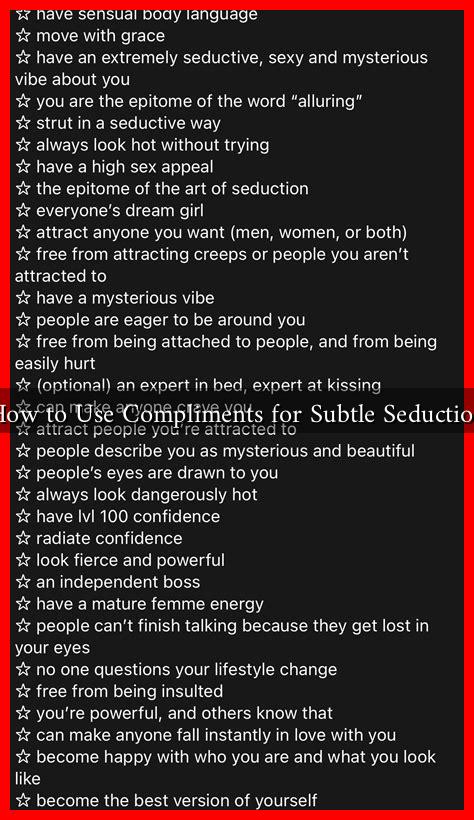-
Table of Contents
How to Use Compliments for Subtle Seduction
Compliments are a powerful tool in the art of seduction. When used effectively, they can create a sense of attraction and intimacy without coming on too strong. This article explores how to use compliments for subtle seduction, providing you with techniques, examples, and insights to enhance your interpersonal interactions.
The Psychology Behind Compliments
Understanding the psychology of compliments is crucial for effective seduction. Compliments can trigger positive emotions and foster a sense of connection. According to a study published in the journal *Psychological Science*, receiving compliments can increase feelings of self-worth and happiness, making individuals more receptive to further interaction.
Types of Compliments That Work
Not all compliments are created equal. Here are some types that can be particularly effective in a seductive context:
- Genuine Compliments: Authenticity is key. Compliment something you truly appreciate about the person, whether it’s their style, intelligence, or sense of humor.
- Specific Compliments: Instead of generic praise, be specific. For example, instead of saying “You look nice,” try “That color really brings out your eyes.”
- Compliments on Effort: Acknowledge the effort someone has put into something, like a project or their appearance. This shows you notice their hard work.
- Compliments with a Twist: Use humor or playful teasing to make your compliment stand out. For instance, “You must be a magician because whenever I look at you, everyone else disappears.”
Timing and Delivery Matter
The effectiveness of a compliment often hinges on timing and delivery. Here are some tips to ensure your compliments land well:
- Choose the Right Moment: Compliment when the person is in a positive mood or when they’ve just achieved something. This amplifies the impact of your words.
- Use Body Language: Maintain eye contact and smile genuinely when delivering a compliment. This non-verbal communication reinforces your sincerity.
- Be Mindful of Context: Ensure that your compliment is appropriate for the setting. A casual compliment in a relaxed environment is more likely to be well-received than one in a formal setting.
Examples of Subtle Compliments
Here are some examples of subtle compliments that can enhance your seductive approach:
- “I love how you think outside the box; it’s refreshing to meet someone with such a unique perspective.”
- “You have an incredible energy about you; it’s contagious!”
- “Your laugh is one of my favorite sounds; it always brightens my day.”
- “You have a great taste in music; I’d love to hear more about your favorite artists.”
Case Studies: Compliments in Action
Real-life examples can illustrate the power of compliments in seduction. Consider the following scenarios:
- Networking Events: At a professional gathering, a woman complimented a man on his presentation skills. This not only made him feel good but also opened the door for further conversation, leading to a deeper connection.
- Social Gatherings: During a party, a man complimented a woman on her choice of accessories. This sparked a discussion about fashion, allowing them to bond over shared interests.
Statistics on Compliments and Attraction
Research indicates that compliments can significantly influence attraction. A survey conducted by the dating app *Hinge* found that 70% of users felt more attracted to someone who complimented them genuinely. This statistic underscores the importance of using compliments as a tool for subtle seduction.
Conclusion: Mastering the Art of Compliments
Using compliments for subtle seduction is an art that requires practice and finesse. By understanding the psychology behind compliments, choosing the right types, timing your delivery, and using real-life examples, you can enhance your ability to connect with others on a deeper level. Remember, the key is authenticity—genuine compliments resonate more than flattery. So, the next time you find yourself in a social setting, don’t hesitate to share a thoughtful compliment; it might just lead to a meaningful connection.
For more insights on effective communication and relationship-building, check out resources like Psychology Today.

